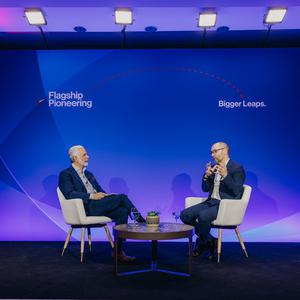Why are partnerships between biotech and pharma so critical to drug development, and why is Flagship a uniquely effective collaborator in advancing groundbreaking therapies?
The extensive clinical and commercial capabilities of the pharmaceutical industry continue to be essential to the creation of invaluable therapies for patients. But as they leverage those capabilities, early-stage discovery and exploration of high-risk “white space” areas of science get deprioritized due to the typically long development timelines. To address this gap and fill pipelines, large pharmaceutical companies have traditionally focused on acquiring assets in the later stages of preclinical development or after clinical proof that a new biology or modality is derisked. However, as new medicines increasingly rely on novel targets and technologies, partnerships with biotech offer more than just assets — they provide a chance to co-shape the innovation journey of a future medicine from the earliest stages.
At Flagship, we are pioneers in scientific discovery with an ecosystem of first-in-category platforms at the cutting-edge of biology. As a result, we can offer pharma partners both a source of transformative assets and the opportunity to engage in a supply chain of innovation, bridging early drug discovery with the essential clinical and commercial activities necessary to bring new drugs to fruition. Our ecosystem includes over 40 companies with platforms that are exploring and advancing areas of untapped scientific potential, giving pharma partners the opportunity to engage early and direct the trajectory of discovery and development toward their priorities. By collaborating with Flagship, pharma companies can gain access to cutting-edge science and expertise to co-create groundbreaking therapies. By leveraging our ecosystem dynamically, pharma can proactively shape external pipelines to address therapeutic challenges in a rapidly evolving landscape.
What is unique about the Flagship approach to partnership?
Flagship seeks to deliver innovative medicines to partners through our Innovation Supply Chain (ISC) model, a long-term collaboration approach initiated at the earliest stages of innovation. This model begins with an umbrella agreement that sets economic and operational terms upfront, allowing teams to focus on scientific discussions that drive the development of a portfolio of single-asset programs. By partnering at the institutional level, we create a streamlined path for collaboration — enabling multiple programs to launch across many different platform companies within the Flagship ecosystem.
As the founders of our companies, Flagship serves as an expert guide to a broad range of cutting-edge science, reducing the time and resources otherwise spent on extensive meetings and due diligence. Each partnership commences with a co-exploration process in which initial ideas and themes are iterated on to identify product concepts of mutual interest. Using the same emergent discovery process we have developed at Flagship to push thinking beyond adjacencies, together we generate many ideas during this phase to get to the ones that hold the most therapeutic promise. Flagship then draws on its deep knowledge of its ecosystem companies to match partners with the platforms best positioned to bring product concepts to life — often enabling the partner to pursue ideas they couldn’t on their own.
The result of this co-creation is the development of a robust and diversified portfolio of programs that feed pharma pipelines, targeting significant therapeutic challenges while mitigating business risk. This portfolio approach is particularly vital when dealing with complex new modalities, as it provides the flexibility needed to effectively evaluate emerging technologies and adapt priorities. To support seamless execution, Flagship brings the expertise of its 140-person Pioneering Medicines team — seasoned drug developers who ensure program continuity, alliance strength, and operational excellence. With shared goals, a flexible business model, and incentives aligned to delivering transformative medicines to patients, ISC partnerships offer a strategic, science-driven approach to collaboration, fostering innovation and success from inception through clinical progression. The result is an integrated supply chain effect that can both speed and enrich the hunt for medicines.
What role does your team play in these partnerships and how is business development different at Flagship?
The business development team at Flagship was conceived as a strategic investment in relationship building. Recognizing the growing scale and complexity of our ecosystem, Flagship aimed to enhance longstanding relationships by creating a dedicated team focused on fostering trusting partnerships.
My team serves as a centralized guide for partners, navigating them through Flagship's ecosystem and opening doors to innovative possibilities and untapped areas of exploration. We engage with partners continuously, understanding their evolving priorities and aligning efforts accordingly. We play a crucial role in maintaining these relationships beyond just annual events, ensuring that communication is frequent and meaningful.
On a tactical level, the business development team works closely with companies to develop their BD strategy and execute deals. This involves a dual focus: understanding the needs of pharmaceutical partners and helping Flagship companies align their strategies accordingly to drive scientific discussions toward meaningful collaborations. Exploration of new areas of science involves risk and uncertainty. We are committed to reducing that uncertainty and building strong partnerships through listening, candor, and flexibility as we structure each deal — creating a foundation of trust that grows with every conversation.
Ultimately, the business development team is integral to driving successful collaborations that are built on cutting edge science, a deep understanding of our partners’ strengths and needs, and ideally, mutual trust.
How do you see the landscape of biopharma partnerships evolving in the future?
The landscape of biopharma partnerships is evolving significantly, driven by increased awareness of new modalities and their therapeutic potential. As a result, there is renewed interest in exploring different pathways and biological processes, which is leading to more early-stage deals focused on targets rather than just molecules.
We are seeing a rise in target-based collaborations, where partnerships form earlier and focus on the foundational aspects of drug development. Unlike one-off acquisitions, these early partnerships involve long-term collaboration, making flexibility in contractual agreements crucial. There is a need for evolution in this area, where both sides become more open to dealing with uncertainty and risk, rather than trying to anticipate every possible outcome up front, which can slow negotiations and the start of the science.
Moreover, biopharma externalization efforts are often cyclical, influenced not only by market conditions but also by where individual pharma companies are in their clinical pipeline and their commitments to investors. Understanding these cycles and addressing early pipeline gaps can offer strategic advantages, allowing partnerships to be more proactive. The future of partnerships lies in embracing these shifts and creating more adaptive and forward-thinking collaboration structures.






